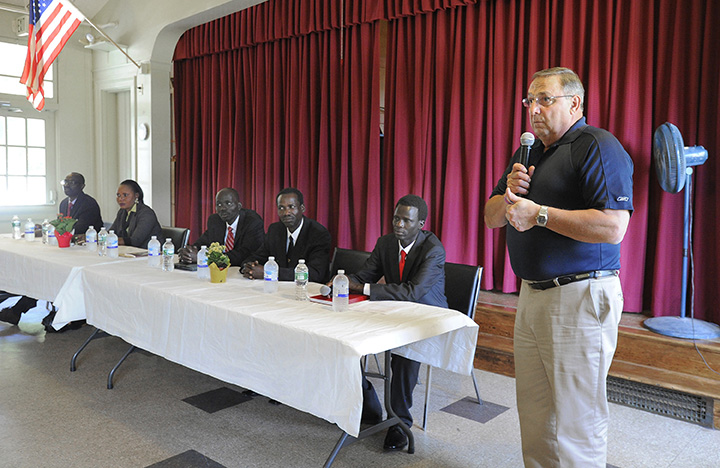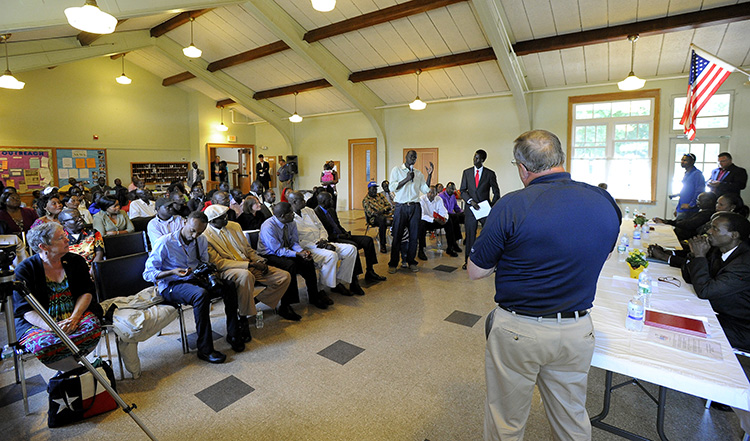PORTLAND — Gov. Paul LePage met with Sudanese refugees in Portland on Friday and pledged to help them with issues ranging from education to the criminal justice system to the poor condition of public housing.
“You brought up a lot of dilemmas,” LePage told the audience in a town hall-style discussion at Trinity Episcopal Church. “I don’t have all the answers but I assure you, when we go back today, we’re going to work diligently to help your community.”
The governor toured Portland’s Kennedy Park and Riverton housing developments before the meeting, and told community members afterward that he saw “deplorable” conditions and “unacceptable” deferred maintenance.
That drew a rebuke from the director of the Portland Housing Authority, who said the agency hadn’t been notified about the governor’s visit or invited to participate.
LePage also criticized legislators for not doing more to help Mainers who are working toward a better life. He said it is “insane” that people receive less assistance and face higher rents when they work harder and make more money.
LePage has defended himself in the last two weeks against criticism that he made a racially insensitive remark about President Obama. Two Republican lawmakers told the Portland Press Herald that they heard LePage say Obama “hates white people” during a party fundraiser on Aug. 12.
LePage has denied using those words, but has apologized to Republicans for any difficulty his remark has caused them.
According to emails provided by the governor’s office, the visit to Portland was arranged at the end of July, well before the controversy arose. Sudanese community leaders invited LePage after meeting with him at the State House in July.
LePage did not directly address the controversy over his remark during Friday’s meeting in Portland, but he said he is sensitive to the effects of racism and cited the fact that his family took in a young man from Jamaica whom he refers to as his son.
LePage did not respond to a reporter’s questions about his reported remark about the president, before or after the event.
About 50 people attended the town hall discussion, and the governor fielded questions from the audience.
The governor’s office did not announce the visit to the media, but a Sudanese community group invited local press coverage. City officials were not officially notified, either.
“I wasn’t invited, so I didn’t attend,” said Mayor Michael Brennan.
The subject of racism came up when a man asked about racism in the workplace and whether it is stifling advancement of immigrants.
“I have a black son,” LePage said. “He told me straight up: ‘Dad, I have never seen racism until I came to Maine.'”
LePage said immigrants have a history of getting the worst jobs available, yet it is possible to work one’s way out of that situation. “Education is the key,” he said.
The questioner, a white man, was later escorted out of the meeting by a Portland police officer, after repeatedly interrupting the program.
People at the meeting told the governor that they came to the United States to work and be productive members of the community, but there aren’t enough opportunities for them to learn English and use their experience and skills so they can enter the workplace.
Claude Rwaganje, executive director of Community Financial Literacy, said even low-wage jobs require English language skills and there is often a six-month wait to enroll in English language courses.
“We have doctors, lawyers and engineers — unfortunately, they’re cleaning houses and housekeeping in hotels,” Rwaganje said.
Small-business owners asked for help in securing capital to start and expand businesses. LePage stopped at the African markets on Forest Avenue and Congress Street before the town hall meeting.
“We can solve the employment issue. We can solve the language barrier. Those are easy,” LePage said. “We just need to do it.”
The Sudanese residents also asked the governor to help fund a new community center so children can have a place to spend their time, other than the streets. Single mothers said the center should provide day care so women can pursue an education, work or start their own businesses.
LePage said he would try to find funding for a center.
“We will work on that with the city of Portland and the Maine State Housing Authority,” he said, later adding, “All the money I spend comes from the Legislature. I can’t promise something I don’t have in my pocket.”
Housing was also raised as an issue.
LePage toured three apartments on Kennedy Street and one on Spring Brook Way before the meeting, a spokesman said. He told the audience that he would convene a meeting with the Maine State Housing Authority to discuss the “deplorable” living conditions in at least one of the subsidized units. “We saw deferred maintenance that is just unacceptable,” he said.
Margaret Laam, a single mother, said she struggles to take care of her 7-year-old while going to school and working seven days a week.
As her income increased, so did her rent. Now that she earns $30,000 a year, Laam said, she is no longer eligible for food stamps or MaineCare. “All of my money is going out the window.”
LePage said it is “insane” for rent in subsidized housing units to increase as income goes up. He also said he has been working for three years to reform food assistance and subsidized housing programs to help people who are trying to get ahead.
Mark Adelson, executive director of the Portland Housing Authority, which manages the Kennedy Park and Riverton units, said it was “unfortunate” that the governor didn’t let the authority know about the visit and arrange a meeting to talk about the housing issues.
Adelson said Kennedy Park was inspected in July by the U.S. Department of Housing and Urban Development. “We got a very high score so I’m not quite sure what the governor was referring to,” he said.
Federal law requires residents to pay 30 percent of their income toward rent to qualify for subsidized housing or rental assistance, he said. A tenant’s share of the cost goes up as his or her income goes up.
“I think (LePage) needs a clearer understanding about how it works,” Adelson said. “If he had called and gave us some notice that he was coming, we would have been happy to review with him all of our programs.”
Randy Billings can be contacted at 791-6346 or at:
rbillings@pressherald.com
Twitter: @randybillings
Send questions/comments to the editors.






Comments are no longer available on this story